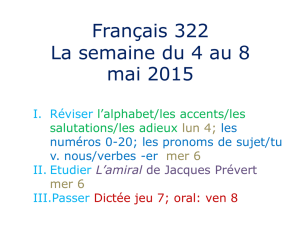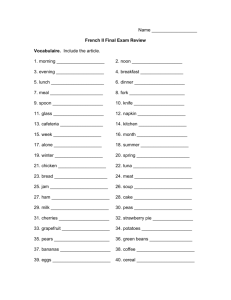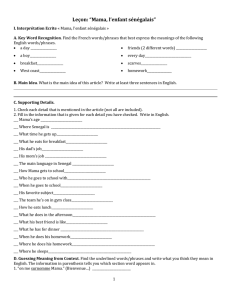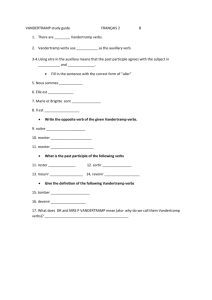File
advertisement
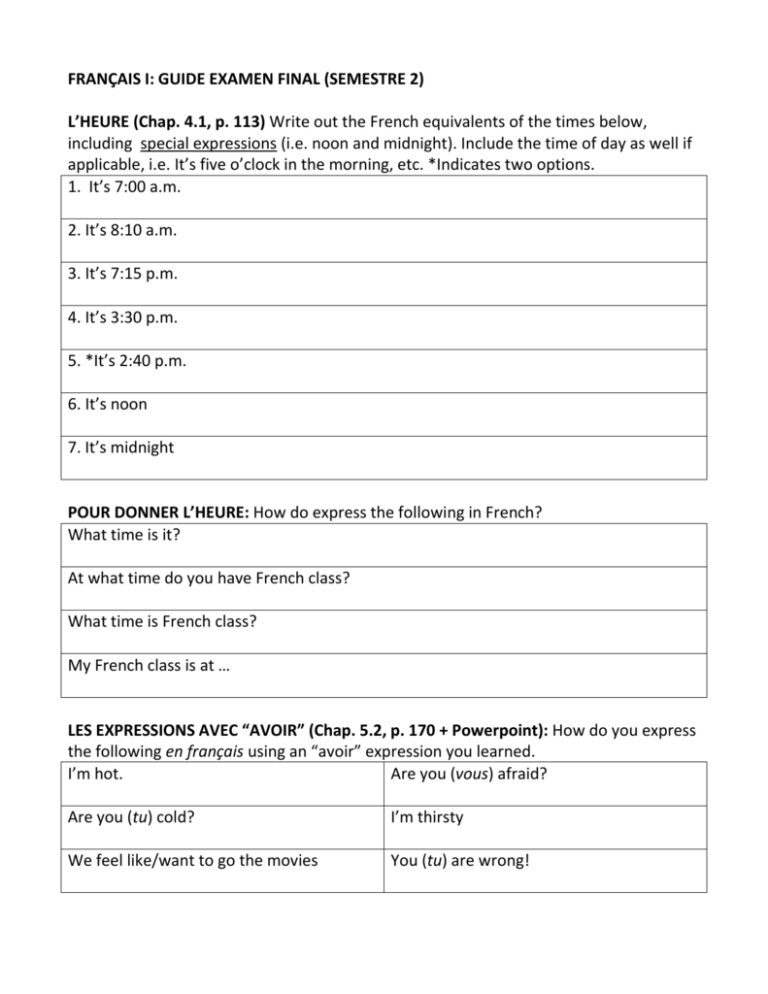
FRANÇAIS I: GUIDE EXAMEN FINAL (SEMESTRE 2) L’HEURE (Chap. 4.1, p. 113) Write out the French equivalents of the times below, including special expressions (i.e. noon and midnight). Include the time of day as well if applicable, i.e. It’s five o’clock in the morning, etc. *Indicates two options. 1. It’s 7:00 a.m. 2. It’s 8:10 a.m. 3. It’s 7:15 p.m. 4. It’s 3:30 p.m. 5. *It’s 2:40 p.m. 6. It’s noon 7. It’s midnight POUR DONNER L’HEURE: How do express the following in French? What time is it? At what time do you have French class? What time is French class? My French class is at … LES EXPRESSIONS AVEC “AVOIR” (Chap. 5.2, p. 170 + Powerpoint): How do you express the following en français using an “avoir” expression you learned. I’m hot. Are you (vous) afraid? Are you (tu) cold? I’m thirsty We feel like/want to go the movies You (tu) are wrong! They are hungry. Madame is right Paul needs to do his homework. We are sleepy. Are you (vous) embarrassed? They trust their friends. My head (la tête) hurts. I’m in a hurry! He is lucky! You (tu) look tired. What is the meaning of AVOIR when it is not being used in the expressions above? Give an example. Why is it important that we remember that these expressions take AVOIR? LES VERBES -CER ET –GER : (Chap 4.1, p. 116) What spelling changes do the following verbs undergo that makes them a bit different than regular –ER verbs? Conjugate each verb, making sure you understand what it means : Je/commencer Vous/corriger Tu/manger Nous/placer Nous/voyager Elles/déranger Vous/avancer Il/échange Tu/remplacer Elle/lancer Je/encourager Elles/prononcer LES VERBES -RE : (Chap 4.1, p. 116) Choisissez le verbe (-RE) correcte pour chaque contexte et conjuguez-le selon le sujet donné : attendre, descendre, entendre, rendre, perdre, répondre, vendre 1. Nous ________________________ le train à la Station Rouge de la Rue Clark. 2. Est-ce que tu _____________________ la cloche (bell) pour la classe? 3. Je _____________________ mes livrès à la bibliothèque après le week-end. 4. Chez le magasin Apple, ils _____________________ des I-phones et des ordinateurs. 5. Vous _____________________ en français à votre prof? 6. Notre équipe (team) n’est pas très bon. Il _____________________ le match du championnat (championship) chaque année (every year). 7. Mon cousin _____________________ visite à notre grand-mère en France en été. LES QUESTIONS: (Chap 5.1, p. 156) Explain in your own words how you form a simple “oui” ou “non” question in French? (3 ways) Ask each of the following questions 3 ways: Do you like French? Are you going to the movies on Saturday? What do you notice we leave out from English when we ask questions in French? QUESTION WORDS: List the French equivalents of question words. Who? When? What? How? Where? Why? Formulate questions in French using question words and the same 3 structures above. When do you leave vacation (en vacances)? Where are you going? PLEASE NOTE: >Qui is not used with “est-ce que” if the answer is the subject of the verb: i.e. Qui voyage en France cet été? Mark voyage… = Qui + verbe >Qui can used with est-ce que or inversion if there is a different subject and the “qui” person is the object of the verb: ie. Qui est-ce que tu invites à ta fête? Qui invites-tu à la fête? J’invite Mark. How would you express: Who is going to movies with us? Who are your favorite teachers? Who are you looking at? “Est-ce que” is also not necessary with the verb “être”: eg. Où est la bibliothèque? Therefore, how would you express the following? When is the exam? How is the French teacher? Create questions that would result in the under-lined responses. Je mange une pizza. Nous allons à Paris cet été. Pauline est à la bibliothèque. Philippe vient avec nous. Charles ne parle pas parce qu'il est timide. Claire chante très bien. Nous avons 5 classes. Nous allons en bus au musée. AU PETIT DÉJEUNER (Chap. 6.1, pp. 184-85) Draw a place setting and label the dishes, utensils and linens using the vocabulary below: une assiette une nappe un bol une cuillère une fourchette une tasse un couteau une serviette un verre LES CATÉGORIES: Fill in the following categories with the le petit déjeuner vocabulary from Chap. 6.1 (pp. 184-185) le pain les fruits les boissons les condiments LES VERBES EN -IR (p. 190) Conjugate the verbe FINIR below for the subject given. Je Nous Tu Vous Il Ils LES AUTRES VERBES EN –IR. Do you remember the meaning of the following –IR verbs? choisir réussir (à) grossir grandir maigrir How are –IR verbs conjugated differently than –ER verbs? How are they similar? VOULOIR (p. 192) What is the meaning of the verb “vouloir”? Can you conjugate VOULOIR properly without looking at your book? Je Nous Tu Vous Il Ils Give 2 sentences or questions using “vouloir”: 1 followed by a noun and 1 followed by a verb. LE DÉJEUNER/LE DÎNER: Fill in the following categories with food vocabulary from Chap. 6.2 (pp. 196-197) les viandes les garnitures (side dishes) les boissons les sandwiches AU CAFÉ (pp. 196-98) How many different ways (using different verbs or expressions) could you order something in a French café? BOIRE (p. 204): Do you remember what the verb “boire” means and it’s conjugation? Je Nous Tu Vous Il Elles PRENDRE (p. 200) Give 3 different meanings for the verb “prendre” and create a sentence or question as examples: Go ahead and try to conjugate PRENDRE without looking at your book. Remember it is conjugated slightly differently than regular –RE verbs. Je Nous Tu Vous Il/Elle Elles What other verbs are conjugated like prendre and what do they mean? COMMANDS (p. 202) Can you explain what a command form is? How is it different from a regular sentence or question? How is it formed? L’IMPÉRATIF (p. 202): How would you turn these polite questions into commands? 1. Sabine, est-ce que tu peux mettre la table s’il te plaît? 2. Thomas et Philippe, est-ce que nous allons au cinéma ce week-end? 3. Claire et Monique, pouvez-vous ranger vos chambres? 4. Paul et André, vous devez faire vos devoirs. 5. Stéphanie, est-ce que tu peux promener le chien, s’il te plaît? 6. Est-ce que nous pouvons étudier ensemble? LES VÊTEMENTS (pp. 222-223): Do you recognize the following items of clothing. Take a guess first, and then confirm the meaning un anorak une chemise une jupe un blouson un chemisier un manteau une casquette un costume un pull un chapeau une cravate une robe des chaussettes une écharpe un tailleur des chaussures un imperméable une veste CE, CETTE, etc. (p. 226) How is the demonstrative article ce (ce manteau) used differently than, for example, le or un? Select the correct demonstrative article (ce, cet, cette or ces) to complete each sentence below. You may determine the gender of the item by its adjective. 1.Qu’est-ce que tu penses de __________ imperméable gris, Lucie? 2.Monsieur, vous avez __________ chemisier bleu en lin? 3. Elle est très élégante, __________ robe! 4. Elles me vont bien __________ bottes vertes? 5. Je cherche une cravate pour aller avec __________ costume noir. Explain in your own words the difference between: ce pull-ci v. ce pull-là. When and why do we add “-ci and -la” to a word? QUEL v. QU’EST-CE QUE (p. 228 + Powerpoint) Do you remember when to use a form of quel versus que (qu’est-ce que) to formulate a question? Explain the 3 contexts in which quel is used (rather than “que”) and give an example of each. LE CHOIX DE VÊTEMENTS: Complete the following questions that a group of friends is asking each other as they prepare to go to the school dance. Use qu’est-ce que or the appropriate form of quel (quel, quels, quelle, quelles). *Feminine nouns. 1.________________________ vous allez porter? 2.________________________ pantalon me va mieux? 3.________________________ chaussures* est-ce que vous préférez? 4.________________________ Robert et Charles portent? 5._________________________chemise* te plaît, la blanche ou la bleue? 6. _________________________ tu veux faire après le bal? 7. _________________________ est le tissu (the material) de cette robe? 8. _________________________ garçons vont accompagner Marie et Christine? 9. _________________________ sont tes couleurs* préférées? 10. _________________________ belle robe à fleurs! METTRE (p. 230): What are 3 different meanings of “mettre”? How is it conjugated ? Is it similar to –re verbs? What are some other verbs with “mettre” in them that have the same conjugation? Conjugate “mettre” Je Nous Tu Vous Il/Elle Elles FAIRE LE MENAGE (pp. 256-57). Comment dit-on en français? Check to see if you remember how to express the following household chores: to sweep to walk the dog to do laundry to vacuum to make the bed to tidy to do dishes to fill the dishwasher to clean to empty to water the plants to take out the garbage to clear off the table to mow the lawn to set the table to wash LES VERBES EN –YER (p. 276): Give the meaning in English of each verb in the first column and conjugate it in the second. balayer Je envoyer Tu essayer Elle nettoyer Nous payer Vous tutoyer = to speak to someone in the “tu” Ils LES VERBES DEVOIR ET POUVOIR (p. 260): What does the verb “DEVOIR ” express? Give 2 sentences as examples of how to use devoir: Can you conjugate it without looking at your book? Je Nous Tu Vous Il Ils What is the verb «POUVOIR» used for? Give 2 sentences as examples of how to use devoir: Can you conjugate it without looking at your book? Je Nous Tu Vous Elle Elles LES PREPOSITIONS DE LIEU (p. 271, 295) : Give the French equivalents for each preposition: downstairs/below to the left between across from under on top at the end in/inside behind in front upstairs/above in the middle next to near to the right far LES MEUBLES (pp. 268-69) : Give the French equivalent for the furniture below: bedside table/nightstand bed dresser sofa bookshelf/shelves closet rug coffee table painting an armchair room bathroom bedroom dining room garden living rom kitchen ground floor building stairwell DORMIR, PARTIR AND SORTIR (p. 272) : Conjugate these important verbs. Je/dormir Nous/dormir Tu/partir Vous/partir Elle/sortir Elles/sortir How are these verbs different from –IR verbs? What do they have in common with –RE verbs? QUESTIONS POUR MADAME GONZÁLEZ: Je ne comprends pas encore… Comment est-ce que je dois étudier…
